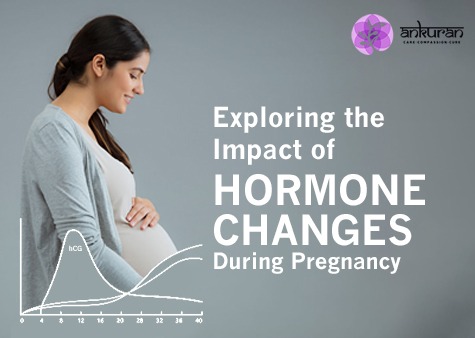Pregnancy is a transformative period marked by significant physiological changes, including fluctuations in hormone levels. Understanding these hormonal changes during pregnancy is crucial as they play a pivotal role in supporting the growth and development of the fetus. Also, these pregnancy hormones can have significant impacts on the body and emotions of the pregnant woman, which makes studying them even more important.
Understanding Hormonal Changes during Pregnancy
Hormones are chemical messengers that regulate bodily functions. The main reason for hormonal changes during pregnancy is to support the growing baby and get the mother’s body ready for giving birth. However, these changes can sometimes lead to a hormonal imbalance. presenting various signs of hormonal changes like mood swings, sore muscles etc, during pregnancy.
Estrogen
As a class of sex hormones, estrogen controls secondary sex traits and the maturation of a woman’s reproductive tissues. It is normally formed in the ovaries and is also made by the placenta during pregnancy to help maintain a healthy pregnancy. The ovaries start making estrogen at the beginning. As the pregnancy progresses until the tenth week, the placenta takes over production.
How does it Changes:
Estrogen levels rise dramatically during pregnancy. The third trimester of pregnancy is when estrogen levels are at their highest, but they rise steadily throughout the pregnancy.
What does it do:
During the first three months of pregnancy, estrogen levels rise, which may make some women feel nauseous. It is actively involved in the process of milk duct development, which leads to larger breasts, throughout the second trimester. Estrogen supports fetal development and forms blood vessels in the uterus and placenta.
Progesterone
During pregnancy, progesterone levels rise to aid in foetal development. At first, the ovarian corpus luteum is responsible for hormone production. The production of progesterone is transferred to the placenta about the 10th week of pregnancy and continues throughout the pregnancy.
How does it Changes:
As the pregnancy advances, progesterone levels gradually climb.
What does it do:
It prepares the uterine lining to receive a fertilised egg by causing it to thicken. Progesterone also enlarges internal structures like the ureters.
Human Chorionic Gonadotropin (hCG)
Of the three hormones released only during pregnancy, this one is unique. The placenta is the primary organ responsible for its production.
How does it Changes:
In the first three months of pregnancy, the levels of the hormone hCG in the mother’s urine and bloodstream increase significantly.
What does it do:
They might contribute to the queasy stomach and vomiting that many expectant mothers experience.
Human Placental Lactogen (hPL)
The placenta secretes a hormone called human placental lactogen (hPL), which is also called human chorionic somatomammotropin (hCS) or human chorionic somatotropin. A foetus receives oxygen and nourishment through the placenta, which is a uterine structure.
How does it Changes:
The levels of hPL steadily increase as the foetus grows.
What does it do:
It nourishes the developing baby. Additionally, it promotes nursing by activating the milk glands in the breasts.
Prolactin
Prolactin is produced by the Pituitary gland. The maturation of mammary glands in the breast and the subsequent production of milk are both aided by prolactin.
How does it Changes:
After giving birth, prolactin levels rise as the baby nurses, which stimulates the mammilla. Prolactin levels remain high so long as the infant continues to nurse.
What does it do:
The secretion of breast milk is stimulated by this hormone. among its many other extensive bodily functions, it regulates the immune system, influences behaviour, and acts on the reproductive system.
Oxytocin
Oxytocin is a neuropeptide and peptide hormone that is typically secreted by the posterior pituitary gland from the hypothalamus. It is involved in critical behavioral processes such as reproduction, social attachment, childbirth, and the postpartum period. Oxytocin production and release are managed by a positive feedback loop. The first release of oxytocin causes more to be produced and released.
How does it Changes:
When the uterus contracts during labour, it releases the hormone oxytocin, which in turn triggers the body to produce and release even more oxytocin, as well as to increase the frequency and force of the contractions.
What does it do?
This hormone triggers labour contractions during childbirth. It also helps with the milk let-down reflex which releases milk from the breasts during breastfeeding.
Relaxin
When a woman is pregnant, her reproductive system and the placenta release the hormone relaxin, which has far-reaching consequences.
How does it Changes:
During the first trimester, there is an increase in levels of relaxin as the Decidua starts to produce additional relaxin into the body.
What does it do:
Its primary function is to “relax” and increase the flexibility of your muscles and ligaments. When you’re pregnant, your body naturally stretches to make room for your growing baby. By easing the pelvic muscles and ligaments, it aids the body in getting ready for delivery.
These hormonal changes during pregnancy don’t just affect mood, but they also create the “glow” of pregnancy and significantly aid in the development of the fetus. They also alter the physical impact of exercise and physical activity on the body. A successful pregnancy cannot occur without these hormones.
Other Hormones and Their Roles
Calcitonin
This hormone during pregnancy is known to be a component of human milk and may play a role in the development of enteric neurons in breastfed infants. It is produced by the thyroid gland and helps regulate calcium levels in your blood by decreasing it.
How does it Changes:
During pregnancy, calcitonin levels have been reported to increase in early pregnancy.
What does it do:
An increase in calcitonin may keep the mother’s bones from breaking down while letting the hormone’s effects on the gut and kidneys continue.
Erythropoietin
This pregnancy hormone is produced by the kidney and promotes the formation of red blood cells in the bone marrow.
How does it Changes:
When comparing EPO concentrations in pregnant women to those in nonpregnant women, you’ll see that they rise.
What does it do:
Erythropoietin plays an important homeostatic role in maintaining haemoglobin concentrations.
Insulin
The beta cells found in the pancreatic islets secrete the peptide hormone insulin. As far as the body is concerned, it is the primary anabolic hormone.
What does it do:
The hormone insulin facilitates the utilisation of glucose by the organism. When you have gestational diabetes, your body either doesn’t create enough insulin or doesn’t use the insulin it does produce effectively during pregnancy, leading to an increase in blood sugar levels. Consequently, your blood sugar levels will be elevated.
Vasopressin
Another name for vasopressin is antidiuretic hormone (ADH), and it plays a role in maintaining a healthy internal water balance.
What does it do:
During pregnancy, women show an attenuated response to vasopressors, which may be partly related to increased baroreceptor sensitivity and increased endothelial nitric oxide synthase activity.
Follicle Stimulating Hormone (FSH) and Luteinizing Hormone (LH)
Both luteinizing hormone (LH) and follicle-stimulating hormone (FSH) are classified as gonadotropins, which means that they activate the reproductive organs (the testes and the ovaries, respectively) in humans. They originate in the brain’s pituitary gland and are secreted by that organ.
What do they do:
The follicle-stimulating hormone (FSH) is important for fertilisation and sexual maturation. FSH regulates female menstruation and ovarian egg production. Males need it to produce sperm.
The luteinizing hormone (LH) is an essential hormone for fertility in both sexes. When a woman’s LH level rises, she ovulates, which means an egg is released from her ovary. For men, LH makes them produce more testosterone, which is needed to make sperm.
Hormonal Changes and Their Effects
The hormonal changes during pregnancy are unique and dramatic, affecting various aspects of a woman’s body and emotions. For instance, the sudden and significant increases in estrogen and progesterone levels can affect mood, leading to heightened emotions and mood swings.
Bottom Line
In the journey of pregnancy, understanding the hormones during pregnancy becomes a vital part of the process. These pregnancy hormones are the silent architects, shaping the course of both maternal and fetal health. Comprehending these hormonal shifts equips expectant mothers with the knowledge to navigate through the physical and emotional changes. Ultimately, these understanding paves the way for a healthier, more informed, and positive pregnancy experience.



No Comments